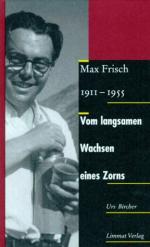|
This section contains 5,975 words (approx. 20 pages at 300 words per page) |

|
SOURCE: Ruppert, Peter. “Brecht and Frisch: Two Theaters of Possibility.” Mosaic 15, no. 3 (September 1982): 109-20.
In the following essay, Ruppert contrasts the aesthetic orientations of Bertolt Brecht and Frisch.
With few exceptions critics have approached Frisch's experimentation in the theater as an extension of Brechtian forms.1 Claims of continuity and influence are generally based on the brief personal friendship of the two playwrights, on their shared thematic interests and concerns, and especially on their use of the “model” or parable form.2 The image of Frisch emerging from these comparisons is that of a somewhat reluctant exponent of epic theater who is attracted by Brecht's formal theories but who resists Brecht's ideological commitments. Thus Frisch is often characterized as “wider Willen—ein Brecht-Adept.”3 Generally overlooked in these comparisons are Frisch's quite unBrechtian assumptions about the nature of dramatic art. In focusing on political and ideological distinctions, critics have minimized fundamental...
|
This section contains 5,975 words (approx. 20 pages at 300 words per page) |

|


